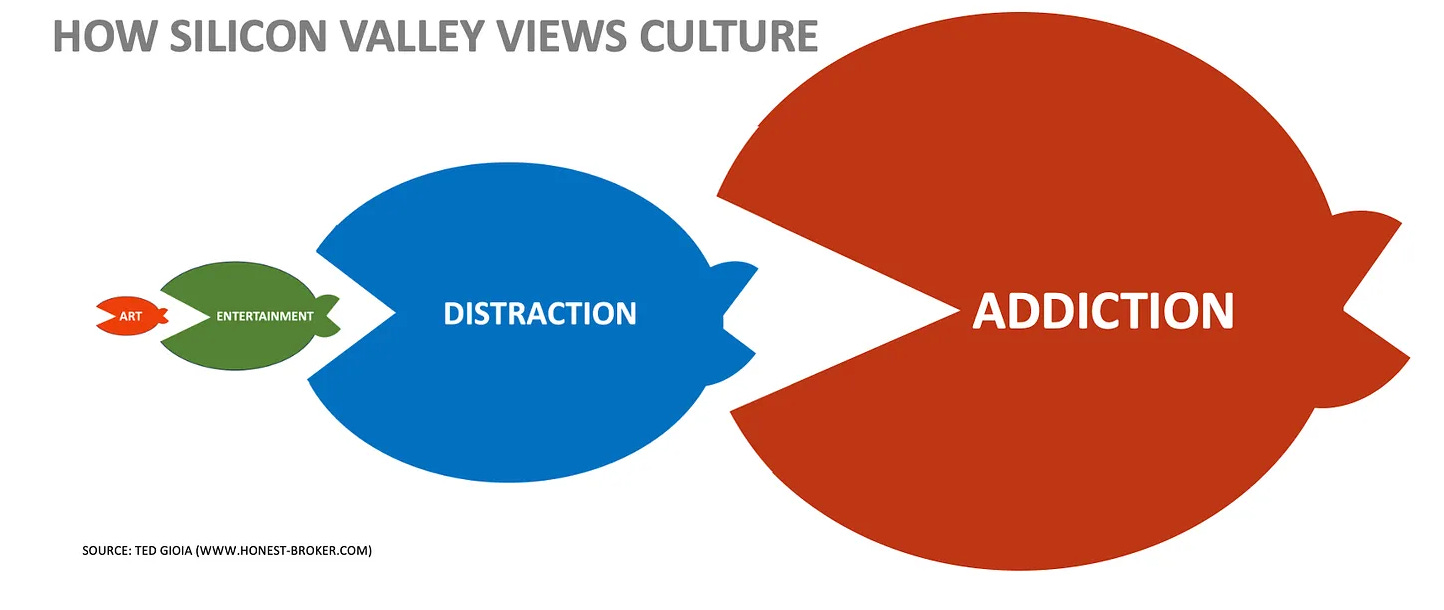Call It What It Is
The Rise of a Dopamine Culture
Peter Drucker famously said “culture eats strategy for breakfast.” He was right. I would contend with others that character, which shapes culture and strategy and power, eats culture before it arrives at the table. Discerning these deep dimensions of life and work and society and church brings me to a new Substack essay by Ted Gioia called “The State of the Culture, 2024.” Please read it.
Gioia gets into what’s going on in our culture today. He claims the “State of Union” addresses by our presidents are snores and bores because “All the action now is happening in mainstream culture—which is changing at warp speed.” So he says we need a “State of the Culture” address and he gives one!
He begins with the claim that the art types that, in the choice between art or entertainment, “entertainment is dead.” He claims entertainment has consumed and eaten art because “we’re witnessing the birth of a post-entertainment culture.” On this he’s right, at least as I perceive it:
Consider the movie business:
Disney is a state of crisis—where everything is shrinking (except the CEO’s paycheck).
Paramount just laid off 800 employees—and wants to find a new owner.
Universal is now releasing movies to streaming after just 3 weeks in theaters.
Warner Bros actually makes more money canceling films than releasing them.
The TV business also hit a wall in 2023. After years of steady growth, the number of scripted series has started shrinking.
Music, he says, is in the worst shape. The new musicians are worth far more than the old. What’s happened to art and entertainment is that is being eaten by “Distraction.” This one is worth digging into a bit. I quote:
“The fastest growing sector of the culture economy is distraction. Or call it scrolling or swiping or wasting time or whatever you want. But it’s not art or entertainment, just ceaseless activity.
The key is that each stimulus only lasts a few seconds, and must be repeated.
It’s a huge business, and will soon be larger than arts and entertainment combined. Everything is getting turned into TikTok—an aptly named platform for a business based on stimuli that must be repeated after only a few ticks of the clock.
TikTok made a fortune with fast-paced scrolling video. And now Facebook—once a place to connect with family and friends—is imitating it. So long, Granny, hello Reels. Twitter has done the same. And, of course, Instagram, YouTube, and everybody else trying to get rich on social media.
The bigger issue that this distraction mode of life is chemical. The brain loves this sudden, surprising stimulation. It wants more of it. Put as Gioia frames it, Distraction is being eaten by Addiction. Which is where we find ourselves today. We dwell in a Dopamine Culture.
(From Gioia’s post)
Tech companies want junkies, not intelligent reading or critical thinking. Here is his summary:
Everything is designed to lock users into an addictive cycle.
· The platforms are all shifting to scrolling and reeling interfaces where stimuli optimize the dopamine doom loop.
· Anything that might persuade you to leave the platform—a news story, or any outside link—is brutally punished by their algorithms. It might liberate you from your dependent junkie status, and that can’t be allowed.
· But wait, there’s more! Apple, Facebook, and others are now telling you to put on their virtual reality headsets—where you are swallowed up by the stimuli, like those tiny fish in my food chain charts. You’re invited to live as a passive recipient of make-believe experiences, like a pod slave in The Matrix.
These companies know what works and they target the young. “Instead of movies, users get served up an endless sequence of 15-second videos. Instead of symphonies, listeners hear bite-sized melodies, usually accompanied by one of these tiny videos—just enough for a dopamine hit, and no more.”
This leads to “anhedonia,” the inability or desire to experience the pleasure. We become sated. He calls it “Silicon Valley zombification.” And, “The dopamine cartel is now aggravating our worst social problems—in education, in workplaces, and in private life.”
The so-called internet fasts, he is saying are actually dopamine fasts.
What are you doing, or trying, about this?



An example.. We used to be able to choose whether or not to see reels on Facebook. Now they cannot be hidden. I use Facebook for God, family, music info and a place to store photos. Suddenly, I am faced with reels every few posts. I once looked at something about a cat so now everything on it is cat. I delete reels every time, a hopeless attempt, it's my form of rebellion. Of course that has no impact on anything.
We've decided to influence grandchildren in many ways, but one is our motto "no child left inside." The "Balanced and Barefoot" and "1000 Hours" voices are heard in our home. God's beauty in nature has ways to strengthen our immune systems, enhance our immune systems, and calm our souls (and vagal pathways). This is what sprung to mind as I read your Substack today. I am going on to read the article you recommended.